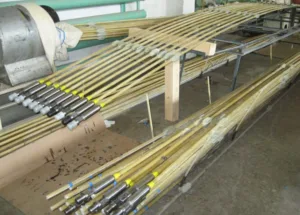In the world of oil and gas production, the choice of sucker rods is a critical decision that can significantly impact the efficiency and longevity of your well. Sucker rods are an essential component of the pumping system in oil wells, and they come in various materials, with fiberglass and steel being the two primary options. In this article, Unicomposite composite profiles will delve into the debate of fiberglass sucker rods vs. steel sucker rods to help you determine which one is better suited for your well.

fiberglass sucker rods
Understanding the Basics
1. What Are Sucker Rods?
Sucker rods are long, slender, and threaded rods used to connect the surface pumping unit to the downhole pump. They play a pivotal role in lifting oil and gas from the wellbore to the surface.
2. Material Matters
The choice of material for sucker rods is crucial, as it affects their performance and durability. Let’s explore the pros and cons of fiberglass and steel rods.
The Battle of Materials
3. Fiberglass Sucker Rods
Fiberglass sucker rods are made from composite materials, typically consisting of fiberglass reinforced with epoxy resin.
3.1. Advantages of Fiberglass Sucker Rods
- Corrosion Resistance: Fiberglass rods are highly resistant to corrosion, making them ideal for wells with corrosive environments.
- Lightweight: They are significantly lighter than steel rods, reducing the load on the pumping unit.
- Flexibility: Fiberglass rods have some flexibility, allowing them to absorb shocks and vibrations, reducing the risk of damage.
3.2. Disadvantages of Fiberglass Sucker Rods
- Cost: They are generally more expensive upfront compared to steel rods.
- Limited Depth: Fiberglass rods are better suited for shallow to moderately deep wells.
4. Steel Sucker Rods
Steel sucker rods, on the other hand, are made of high-strength steel alloys, making them a traditional choice in the industry.
4.1. Advantages of Steel Sucker Rods
- Strength: Steel rods are known for their exceptional strength, making them suitable for deep and demanding wells.
- Durability: They have a long lifespan and can withstand harsh conditions.
- Cost-Effective: Steel rods are often more cost-effective in the long run.
4.2. Disadvantages of Steel Sucker Rods
- Corrosion Prone: Steel rods are susceptible to corrosion, especially in corrosive well environments.
- Heavier: They are significantly heavier than fiberglass rods, which can strain the pumping unit.
The Decision-Making Process
5. Assessing Your Well
To determine which type of rod is better for your well, consider factors such as well depth, well environment, and budget.
6. Well Depth Matters
- For shallow to moderately deep wells, fiberglass rods may be the better choice due to their corrosion resistance and flexibility.
- For deep and demanding wells, steel rods are recommended for their strength and durability.
7. Environmental Factors
Evaluate the corrosiveness of your well’s environment. If corrosion is a significant concern, fiberglass rods are the safer option.
8. Budget Considerations
Consider your budget constraints. While fiberglass rods may have a higher upfront cost, steel rods may require more frequent replacements in corrosive environments.
Making the Right Choice
9. Consultation
Seek advice from experts and manufacturers to make an informed decision.
10. Trial Runs
Consider conducting trial runs with both types of rods to assess their performance in your specific well.
11. Maintenance
Regular maintenance and inspections are crucial for the longevity of your chosen rods, regardless of the material.
Conclusion
In the battle of fiberglass sucker rods vs. steel sucker rods, there is no one-size-fits-all answer. The choice depends on the unique characteristics of your well and your budget considerations. Take the time to assess your well’s depth, environmental factors, and budget to make an informed decision that will maximize the efficiency and lifespan of your pumping system.
FAQs
1. Are fiberglass sucker rods more expensive than steel rods?
- While fiberglass rods have a higher upfront cost, their long-term durability can make them a cost-effective choice, especially in corrosive environments.
2. Can steel sucker rods be used in shallow wells?
- Yes, steel rods can be used in shallow wells, but they are most effective in deep wells due to their strength.
3. Do fiberglass sucker rods require special maintenance?
- Regular maintenance is essential for all sucker rods. Fiberglass rods may require less maintenance due to their corrosion resistance.
4. How do I assess the corrosiveness of my well’s environment?
- Consult with a professional or use corrosion testing methods to evaluate the well’s environment.
5. Can I switch from steel to fiberglass rods or vice versa?
- Switching rod materials is possible but requires careful consideration of compatibility and potential adjustments to the pumping system.
In conclusion, choosing between fiberglass and steel sucker rods is a decision that should be based on a thorough assessment of your well’s specific needs. Each material offers its own set of advantages and disadvantages, and your choice will ultimately impact the efficiency and longevity of your well. Consult with experts and consider your budget to make the best decision for your oil and gas production operations.
 info@unicomposite.com
info@unicomposite.com


























